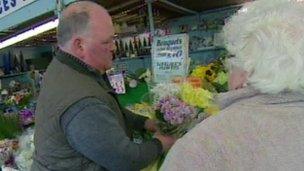How has immigration changed Britain?
- Published
Nick Robinson visits Peterborough to see how immigration has changed Britain
The Italian boss of the "city the Poles took over" tells me that the new arrivals will integrate, just as his community once had to.
He is answering the criticisms made not just by the white British residents but a significant number of the city's large Asian community, who complain that eastern Europeans simply don't integrate.
Sounds like America but, in fact, this is the UK - Peterborough, to be precise. I've been filming in the city to examine the political impact of immigration for The Editors on BBC One.
Britain has changed and nowhere more so than in Peterborough. In the past decade 24,000 immigrants moved into this city. That is more than one in eight of the population.
Many of them were Poles (hence the tabloid headlines) but eastern Europeans are far from the only group who've been coming in large numbers. In the last decade nearly 5,000 people born in Pakistan made their home in the city, compared with more than 6,500 from Poland.
Insecurity
More than a fifth of all people who live here were born outside the UK, according to the latest census.
With over a million eastern Europeans making their home in the UK over the last decade immigration has become, once again, a mainstream political issue. The leaders of the three main political parties have all given major speeches on the issue in recent weeks.

Florist Steve says eastern European immigration helps his business
One reason for that may be that the polls show that over half the population think immigration should be cut - by a lot - and that voters now trust the new political kid on the block, UKIP, most on the issue. It was the key driver of votes to UKIP in the recent Eastleigh by-election where the party shocked the Westminster village by coming second.
Voters have been asking politicians to fix what they see as a problem for years. What has changed recently, though, is the number who say that the impact of immigration has been "very bad" - it's almost doubled from 11 to 21% over the last decade.
According to the British Social Attitudes survey, it's the poorest, least well educated and most insecure who feel that most including, interestingly, many first or second-generation migrants.
In Peterborough market Ian, who runs the shoe-repair stall, tells me that his house is for sale as he no longer believes his son will get a good education in the city. One school recently revealed that none of its pupils spoke English as a first language. In Peterborough 10% of households have no-one at home who speaks English.
Once the issue of immigration and race were inextricably linked, making the issue hard for mainstream politicians to talk about without being accused of racism. The arrival of so many white Christian Europeans has changed all that.
Attitudes
Interestingly, Param Singh, who runs the One World food stall supplying ingredients from all over the world to the city's Afro-Caribbean and Asian residents, agrees. He tells me that when his father moved from the Punjab to Peterborough he integrated - not so, he claims, those who have made the journey from Europe.
The florist, Steve - white, working-class and British - welcomes the new immigrants. He lives in nearby Boston, in which many of those who work on the land - and work hard for low pay - are eastern Europeans. Their labour allows businesses like his to keep going, he argues.
Peterborough's political leader is an Italian. Marco Cereste's family came in the 1950s with thousands of fellow countrymen recruited to work in the local brick works which, you guessed it, couldn't find locals to do the dirty jobs.
Marco remembers being called a "wop", being beaten up at school and being refused a place at the local grammar on the grounds that an Italian couldn't make good use of the opportunity.
A Conservative, in a city where the local Tory MP has led calls for tougher immigration control, he insists that he is an optimist. The Poles will fit in just as the Italians did. Immigration has posed real problems for the council but it has also brought economic growth.
In my film I examined public attitudes, not policies.
While politicians are catching up with the public by debating how to limit immigration, people are increasingly asking questions not just about who should now be allowed to come here, but how to achieve integration in a society which has changed dramatically in recent years.
The Editors is broadcast on BBC One on Monday 29 April at 23:25 BST. It is also on BBC World News.